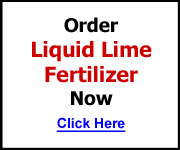Natural Liquid Lime Fertilizer
Natural Liquid Lime is an easy, effective alternative to bagged lime for use on permanent ground covers such as turf, pastures and hay fields. This product utilizes very fine lime in a liquid suspension, which is absorbed by the leaves and roots. Natural Liquid Lime should be used with Natural Fertilizer 4-3-3 to supply additional calcium to crops such as tomatoes, potatoes, cabbage, and lettuce that need copious amounts of this vital nutrient.
Calcium is the plant’s servant. It regulates opening and closing of stomates, removes toxins from the tissue, contributes to the development of shoots and roots, and keeps out unwelcome invaders.
Many acidic soils do not contain enough calcium to support prolific plant growth. When soil pH is below 6.0, plants may show signs of calcium deficiency such as yellowing of leaves, retarded growth of roots and shoots, dieback of growing tips, and premature death of older leaves. Natural Liquid Lime applications are the easy way to correct a calcium deficiency without tilling in bagged lime.
Soil liming must not be ignored when planting a new lawn, pasture or hay field. Soil liming increases microbial activity and the proliferation of earthworms and beneficial insects. Soil health is an on-going process; the immediate goal, however, is producing green lawns, productive pastures and high yielding hay fields that need calcium to promote prolific plant growth.
Natural Liquid Lime is made with dolomitic limestone containing the essential nutrients calcium and magnesium. Calcium improves soil texture, makes phosphorus and micronutrients more available to the plant and improves the environment for microorganisms, the builders of the soil.
Magnesium is part of the lifeblood, or chlorophyl, of the plant and controls the development of this molecule. If we had magnesium in our blood instead of iron, we would be plant life. Dolomitic lime is about 35-45 percent magne¬sium. Natural Liquid Lime has about seven percent calcium and four percent magnesium.
Typical granular or bagged limestone application instruc¬tions for field or garden will specify to apply a certain number of pounds per acre or per 100 square feet to raise soil pH and increase alkalinity. Depending on how fine the lime is and the character of the soil, it could take three years to raise soil pH one point. That is the time usu¬ally allowed for all the limestone to break down and become a useful part of the soil. Most ground limestone is usually 50 percent through a 100 fine mesh screen.
Natural Liquid Lime is super-finely ground dolomitic limestone, with 100 percent passing through a 300 fine mesh screen. When mixed with water, as directed, the lime becomes available to the plant immediately. The readily available calcium in the soil around the plants encourages the utilization of other nutrients. The crop responds with vigorous green growth since it can now use nutrients more effectively.
As fine as Natural Liquid Lime is for lawn, turf, pasture and food plots, there are other useful applica¬tions as well.
One customer is a certified pesticide dealer, and after talking to the liquid lime fertilizer department, he tried using the Liquid Lime along the sides of brick and stucco houses to help remove moss that had accumulated over time. To his amazement, the Liquid Lime killed the moss and helped eliminate it from the sides of the houses.
Liquid Lime is also a great treatment to eliminate moss around pine trees and shaded grassy areas. Moss proliferates in acidic areas and soils, therefore the alkalinity of the Liquid Lime neutralizes the soil, brick and stucco to kill the moss.
How Do I Get It?
Fill out the form for more information about liquid lime or call me at 913-708-1985. To order right away, click on the button below. Call me for bulk pricing for your farm or business.
ORDER LIQUID LIME NOW
NOTE: Liquid Lime is not availabe for purchase in GA, MN, NC, OR.
Note: For specific information relating to pastures, please go to our pasture fertilizer page.

